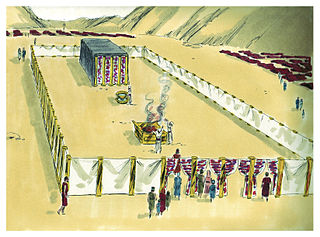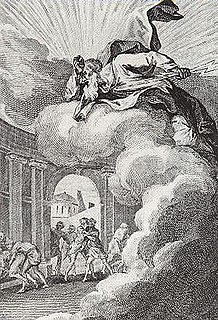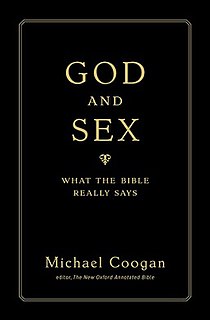Onan found in the Book of Genesis chapter 38, was the second son of Judah and Shua. He was the brother of Er and Shelah. Like his older brother Er, Onan was slain by Yahweh. Onan's death was retribution for being evil in the sight of Yahweh(or Lord).

Incest in the Bible refers to sexual relations between certain close kinship relationships which are prohibited by the Hebrew Bible. These prohibitions are found predominantly in Leviticus 18:7–18 and 20:11–21, but also in Deuteronomy. Jewish views on incest are based on the biblical categories of forbidden relationships and have been subject to rabbinic interpretations in the Talmud. The Karaites reject the authority of Talmudic opinions and interpret the biblical prohibitions differently. The various Christian denominations set their own categories of prohibited incestuous relationships, which have changed from time to time. The laws of many countries regarding prohibited relationships do not necessarily follow the biblical prohibitions nor those of any particular church.

David and Jonathan were, according to the Hebrew Bible's Books of Samuel, heroic figures of the Kingdom of Israel, who formed a covenant, taking a mutual oath.

Leviticus 18 deals with a number of sexual activities considered abominable, including incest, bestiality, and homosexuality. The chapter also condemns Moloch worship. It is part of the Holiness Code, and its sexual prohibitions are largely paralleled by Leviticus 20, except that chapter 20 has more emphasis on punishment.

There are a number of passages in the Hebrew Bible and the New Testament that have been interpreted as involving same-sex sexual acts, desires, and relationships. The passages about homosexual individuals and sexual relations in the Hebrew Bible are found primarily in the Torah. Some texts included in the New Testament also reference homosexual individuals and sexual relations, such as the Gospel of Matthew, the Gospel of Luke, and various letters attributed to the Apostle Paul originally directed to the early Christian churches in Asia Minor. Both references in the Hebrew Bible and the New Testament have been interpreted as referring primarily to male homosexual individuals and sexual practices.
Abomination is an English term used to translate the Biblical Hebrew terms shiqqutsשיקוץ and sheqetsשקץ, which are derived from shâqats, or the terms תֹּועֵבָה, tōʻēḇā or to'e'va (noun) or 'ta'ev (verb). An abomination in English is that which is exceptionally loathsome, hateful, sinful, wicked, or vile.

Women in the Bible are wives, mothers and daughters, victors and victims, women who change the course of historical events, and women who are powerless to affect even their own destinies.
Among the world's religions, views on masturbation vary widely. Some religions view it as a spiritually detrimental practice, some see it as not spiritually detrimental and others take a situational view. Among these latter religions, some view masturbation as allowable if used as a means towards sexual self-control, or as part of healthy self-exploration, but disallow it if it is done with motives they consider to be wrong, or as an addiction. For example, Christian denominations have different views on masturbation. Today, Roman Catholic, Eastern Orthodox, Oriental Orthodox and some Protestant Christians consider masturbation to be a sin. Many Protestant churches in Northern and Western Europe and some Protestant churches in Northern America and in Australia/New Zealand see masturbation as not a sin.

Sodom and Gomorrah were two legendary biblical cities destroyed by God for their wickedness. Their story parallels the Genesis flood narrative in its theme of God's anger provoked by man's sin. They are mentioned frequently in the prophets and the New Testament as symbols of human wickedness and divine retribution, and the Quran also contains a version of the story about the two cities. The legend of their destruction may have originated as an attempt to explain the remains of third-millennium Bronze Age cities in the region, and subsequent Late Bronze Age collapse.

Sodomy or buggery is generally anal or oral sex between people, or sexual activity between a person and a non-human animal (bestiality), but it may also mean any non-procreative sexual activity. Originally, the term sodomy, which is derived from the story of Sodom and Gomorrah in the Book of Genesis, was commonly restricted to anal sex. Sodomy laws in many countries criminalized the behavior. In the Western world, many of these laws have been overturned or are routinely not enforced. A person who practices sodomy is sometimes referred to as a sodomite.

Tamar was a princess of Israel, the daughter of King David and sister of Absalom in 2 Samuel in the Hebrew Bible. In the biblical narrative, she is raped by her half-brother Amnon.
Forbidden relationships in Judaism are intimate relationships which are forbidden by prohibitions in the Torah or rabbinical injunctions.

There are a number of passages in the Hebrew Bible that have been interpreted as involving same-sex sexual acts, desires, and relationships. The passages about homosexual individuals and sexual relations in the Hebrew Bible are found primarily in the Torah and have been interpreted as referring primarily to male homosexual individuals and sexual practices.

There are at least three passages that refer to non-heterosexual sexual intercourse in the New Testament (NT), all of which are found in the Pauline epistles: Romans 1:26–27, 1 Corinthians 6:9–10, and 1 Timothy 1:9–10. A fourth passage, found in Jude 1:7, is often interpreted as referring to homosexuality. In the synoptic Gospels, Jesus discusses marriage only in a heterosexual context when he cites the Book of Genesis during a discussion of marriage.
Jewish traditions across different eras and regions devote considerable attention to sexuality. Sexuality is the subject of many narratives and laws in the Tanakh and rabbinic literature.

God and Sex: What the Bible Really Says is a book by Michael Coogan, published in 2010.
The prohibition of extracting semen in vain is a rabbinic prohibition found in the midrash and Talmud. The prohibition forbids a male from intentional wasteful spilling of his semen.
Phyllis Trible is a feminist biblical scholar from Richmond, Virginia, United States. Trible's works centres on the Hebrew Bible, and is considered by some in her field as a prominent influence on feminist biblical interpretation. Trible has written a multitude of books on interpretation of the Hebrew Bible, and has lectured around the world, including the United States, New Zealand, Australia, Japan, Canada, and a number of countries in Europe.

The Hebrew Bible contains a number of references to rape and other forms of sexual violence, both in the Law of Moses, its historical narratives and its prophetic poetry.
In the Bible, to-e-vah means: "an abomination ." It can also be defined as "an unclean thing" because unclean animals or food were abhorred. It refers to [unclean food, an idol, idolatry, outrageous conduct, adultery, etc.]. It is a Hebrew noun formed from the verb root ta-av "he abhorred [despised, hated, detested]. (Prov. 6:16-19 NKJV) says: "These six things the Lord hates, Yes, seven are an abomination to Him: A proud look, A lying tongue, Hands that shed innocent blood, A heart that devises wicked plans, Feet that are swift in running to evil, A false witness who speaks lies, And one who sows discord among brethren."










